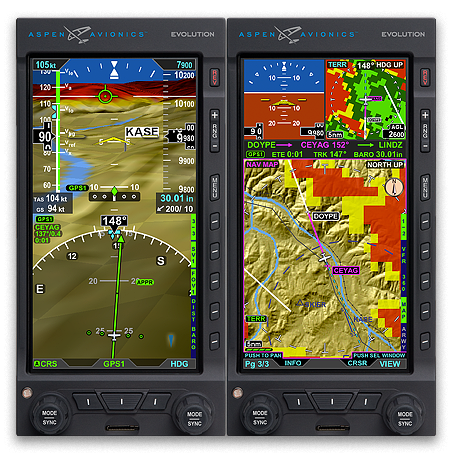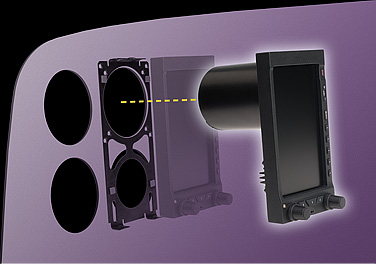

Evolution 2000
MFD Versatility with Full PFD Backup.
The Evolution 2000 combines the Pro PFD and the 1000 MFD to provide a system with MFD versatility as well as the safety and confidence of full PFD instrument redundancy. This Evolution Flight Display pair is an unbeatable duo that provides everything you need in an easy-to-use, full-featured glass cockpit for your GA aircraft.

Evolution 2000
Overview
Evolution 2000: Total Instrument Redundancy, by Design
The Evolution 2000 combines the Pro PFD and the 1000 MFD to provide a system with MFD versatility as well as the safety and confidence of full PFD instrument redundancy. This Evolution Flight Display pair is an unbeatable duo that provides everything you need in an easy-to-use, full-featured glass cockpit for your GA aircraft.
Safety First. And Second.
The cornerstone of aviation safety is redundancy. Aspen’s trailblazing Evolution 2000 is the only GA EFIS display that provides total system redundancy – at less fly-away cost than any competing system.
Evolution 2000’s safety architecture delivers an exclusive total backup ability that steam gauges and competing glass can’t match. From full PFD capability built into the MFD to dual redundant backup batteries, Evolution offers the only glass panel that can effectively eliminate heavy, unreliable steam instruments.
Aspen’s unique PFD/MFD window layout flexibility allows you to configure displays to prioritize critical flight data. Multiple views at your command significantly enhance situational awareness.
Features

Full PFD Redundancy

Professional-Grade EFIS

Optional Evolution Hazard Awareness

Optional Evolution Synthetic Vision
Features
Dual Independent LCD Displays
Redundant Solid-State Attitude Heading Reference Systems with Independent Gyro, Accelerometer and Magnetic Sensors
Redundant Air Data Computers with Independent Airspeed & Altitude Pressure Transducers
Redundant Emergency Batteries (30 Minutes Runtime or 2 Hours with Optional External Battery)
Redundant Emergency GPS Receivers (optional)
Dual Sixpack Displays
Dual HSIs
Dual GPSS Computers
Evolution Synthetic Vision (optional)
GPS flight plan map views, choose from 360º or Arc view
Electronic Attitude Director Indicator (ADI) with airspeed and altitude tapes
Approach mode with lateral and vertical deviation indicators and approach minimums alert
Integral GPS Steering(1)
Altitude alerter
Dual GPS and dual VHF nav support
Autopilot & flight director integration
Display of real-time winds aloft, OAT, TAS, and ground speed(1)
Traffic and weather overlays (optional)
Moving map that displays GPS flight plan legs, curved flight paths(1), waypoints, navaids and airports
Brilliant, direct sunlight-readable, 6-inch 760x400 TFT active matrix LCD display (140 pixels/inch)
(1) With compatible GPS navigators.
Specifications
Specifications
General Specifications (per EFD):
Overall Dimensions 3.50” W x 7.00”H x 4.15”D
Weight 2.9 lbs. with mounting bracket
Display Type 6.0” Diagonal TFT Active Matrix LCD
Display Resolution 400x760
Display Backlight High Intensity White LED
Display Colors 32,768
Operational Specifications:
Operating Temp -20°C to +55°C
Storage Temp -55°C to +85°C
Max Operating Altitude (unpress.) 35,000
Cooling Integral Fan
Max Humidity 95% at 50°C
Input Voltage +8 to +32 Volts DC
Max Current 2.4 Amps @ 28 Vdc / 4.8 Amps @ 14 Vdc
I/O Specifications:
ARINC 429 Inputs 5 Low Speed
ARINC 429 Outputs 1 Low Speed
RS-232 Inputs 5
RS-232 Outputs 3
Pitot / Static Quick Connect
Certification Specifications:
FAA and EASA Technical Standard Orders
TSO/ETSO: C2D, C3D, C4C, C6D, C8D, C10B, C106, C113
Software
RTCA DO-178B Level C
Environmental
RTCA DO-160E
Categories
See Environmental Qualification Sheet
Installations

Engineered for Easy Installation
The Evolution flight displays are innovative, modular system components that slide into existing 3-inch instrument holes in any instrument panel. A universal bracket provides easy surface mounting. The system can optionally be flush mounted. This unique design dramatically reduces installation time and cost.
The modular Evolution platform allows for easy expansion. The integrated displays mount side-by-side in one, two, and three display configurations for supreme flexibility and upgradability.
See Evolution installations in aircraft like yours in the Aspen Customer Gallery
Resources

Product Resources
Genesys Aerosystems (S-TEC) System 55X Autopilot Integration
Evolution Angle of Attack System
Evolution EFD1000 Pro MAX PFD brochure
Evolution Flight Display System Comparison Guide
Evolution 2000 2-page brochure
Primary Flight Display Comparison Chart

